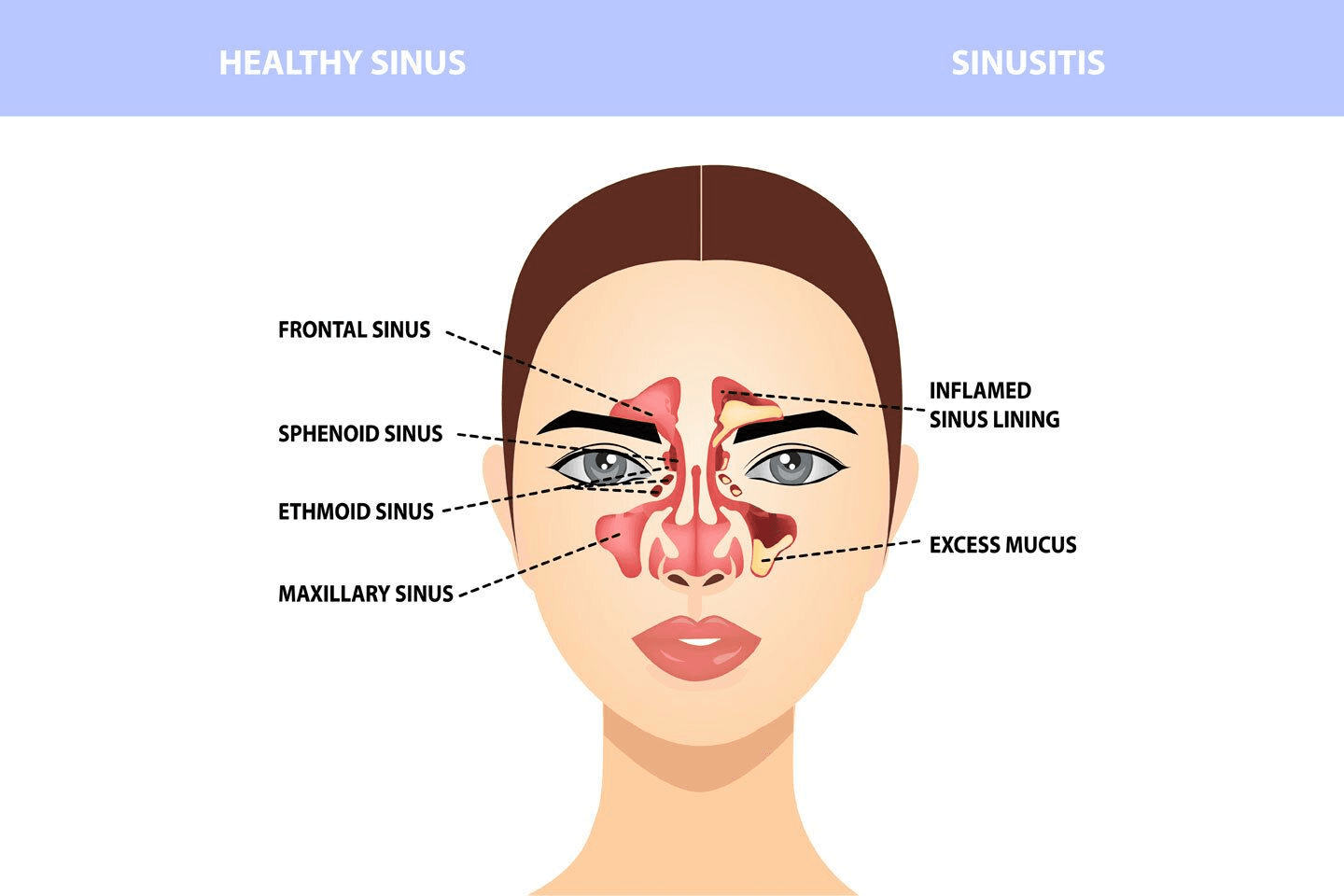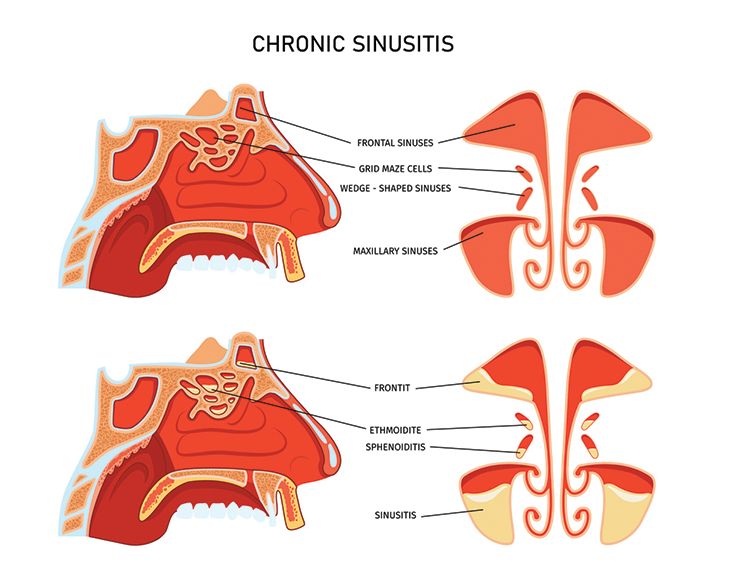
Common Problems After Sinus Surgery
What are sinuses?
Sinuses are cavities in the bones of your head. They are found tucked away at the back of your forehead, cheeks, eyes, and nose. Air fills these cavities and plays many vital functions in your body. An important function of the sinuses is to produce mucus, a thin and slippery substance. The mucus then travels into your nose and keeps dust, germs, and other pollutants from getting into your body. It prevents germs and other dangerous substances from getting to your lungs. Within your sinuses are very small hair-like parts called cilia. The motion of these cilia causes the mucus and other foreign substances to flow out of your nose. Another important function of the sinuses is to make the air you inhale more humid. They partly give your voice its unique quality. They also boost your defense system by getting rid of germs and bacteria. Lastly, they help make your head feel lighter and less heavy.
What is sinus surgery?
Sinus surgery removes blockages in the sinus pathways, often necessary for individuals with chronic sinus infections, abnormal sinus structures, infected tissue or bone, or growths like polyps. Surgery becomes a viable option when sinus infections do not respond to medications. Most sinus surgeries are minimally invasive, offering quick recovery and minimal discomfort. ENT (ear, nose, and throat) surgeons, also known as otolaryngologists, typically perform these procedures.
Types of Sinus Surgery
Functional Endoscopic Sinus Surgery (FESS): A minimally invasive procedure using a nasal endoscope—a thin, flexible tube with a camera and light—to treat severe sinus conditions without external incisions.
Balloon Dilation Sinus Surgery: This procedure involves inserting a catheter with a small balloon into the nostril. The balloon is inflated to expand the sinuses, allowing for drainage. It's commonly used for chronic sinusitis that is unresponsive to other treatments.
Common Post-Surgery Symptoms
While sinus surgeries are safe in most cases, patients may experience certain post-operative symptoms, which typically resolve over time with proper care:
Pain and Swelling: Mild discomfort, swelling, and tenderness around the nose, cheeks, or eyes are common in the initial days following surgery.
Nasal Congestion: A feeling of stuffiness or congestion, similar to a cold, may persist for one to two weeks.
Fatigue: Some patients report tiredness post-surgery, which can be attributed to the body's healing process and medications.
Bleeding: Minor bleeding within the first 24 hours is typical. Patients are advised to avoid blowing their noses and gently dab away blood.
Temporary Loss of Smell and Taste: Patients might experience a temporary reduction in smell and taste after polyp removal, often due to residual dried blood in the nasal passages.
Rare Complications
Though uncommon, certain complications can arise:
While generally well-tolerated, sinus surgery may occasionally present certain adverse outcomes:
Infection after surgery: Sometimes, after sinus procedures, inflammation can create an environment where bacteria grow, leading to infections. These infections might need specific antibiotics to clear up.
Vision issues: Rarely, surgery near the eye area can cause double vision or blurry sight. This usually happens if the delicate structures around the eye are accidentally irritated or injured during the procedure.
Fluid leak from the brain area: In uncommon cases, surgery can cause a small tear in the protective lining around the brain. This may let the fluid that cushions the brain leak into the nose. If this happens, it needs prompt attention to prevent serious infections.
Return of symptoms: Sometimes, sinus problems come back even after treatment. If this occurs, doctors may need to reevaluate and consider further treatment options or repeat surgery.
Post-Surgery Care and Products
Proper aftercare is a fundamental component of successful surgical recovery. Specialized nasal packing solutions designed specifically for sino-nasal procedures can significantly enhance the post-operative healing process.
Post-Operative Nasal Packing Solutions
The medical device landscape offers advanced Polyvinyl Alcohol (PVA) nasal packing options that function as sterile, single-use therapeutic interventions. These specialized packing materials are engineered to address post-surgical hemostasis while simultaneously supporting the delicate healing process of the sino-nasal mucosa.
Therapeutic Characteristics of PVA Nasal Packing
Biocompatible Composition: Constructed from medical-grade Polyvinyl Alcohol, providing optimal tissue compatibility with minimal inflammatory response
Hemostatic Efficacy: Strategically designed to manage post-procedural bleeding through controlled absorption properties
Structural Support: Maintains appropriate anatomical positioning of reconstructed sinus passages during critical healing phases
Moisture Regulation: Facilitates balanced hydration of healing tissues while preventing excessive fluid accumulation
The implementation of these specialized nasal packing materials represents an evidence-based approach to post-operative care, potentially contributing to reduced complication rates and enhanced patient comfort during the recovery period.
Benefits:
Controls Bleeding: Provides effective hemostasis within 2-3 minutes.
Prevents Adhesions: Helps in reducing the formation of scar tissue.
Promotes Healing: Maintains a moist environment conducive to tissue regeneration.
Absorbable: Fully absorbs within 3-4 weeks, eliminating the need for painful removal.
Safety Profile:
NOSZEL™ is non-toxic, non-allergic, non-immunogenic, and non-pyrogenic.
Meril Life offers NOSZEL nasal packing, a gelatin-based sponge that completely absorbs within 3 to 4 weeks without any residue. It's beneficial as a temporary wound dressing post-sinus surgery because you will not have to visit the doctor for possibly painful packing removal. NOSZEL is designed to keep the wound moist, reduce adhesions, and encourage healing. NOSZEL is non-toxic, non-allergic, immunogenic, and non-pyrogenic.
Final note
Sinus surgery can offer lasting relief from chronic sinus issues when paired with proper post-operative care. By understanding potential symptoms, watching for signs of complications, and following your surgeon’s aftercare instructions closely, you can promote smooth healing and achieve the best possible results. Always stay in touch with your healthcare provider during recovery to ensure any concerns are addressed promptly.



